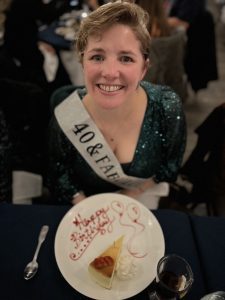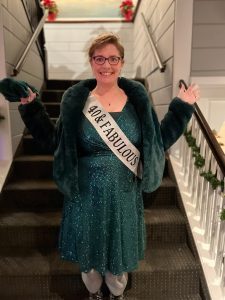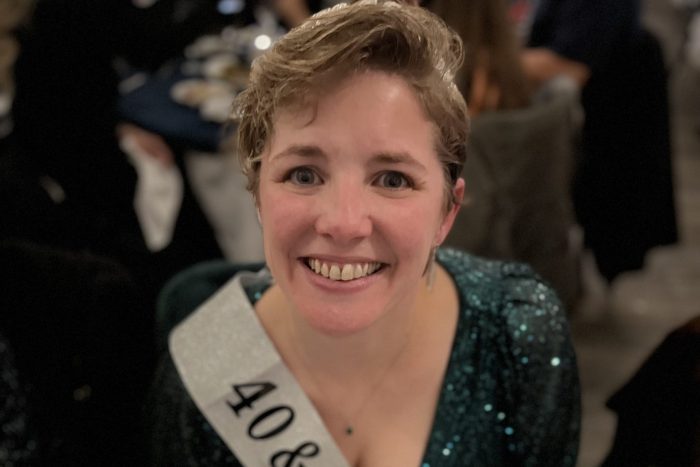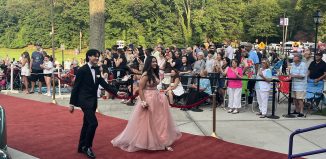AN INSPIRING COMEBACK: Huntington stroke survivor shares her story
By Stephanie Giunta
In honor of National Stroke Awareness Month, we would like to honor a local survivor, Claudia Fortunato-Napolitano, who is beyond inspirational. Here is her story.
On January 11, 2017, 34-year-old Huntington Village resident Claudia Fortunato-Napolitano, went to work like it was any other day, although she remembers having a bad headache. The passionate history buff and Executive Director at the Huntington Historical Society was making some personal calls during her lunch break. As she sat down to eat her lunch, she suddenly felt dizzy; her coworker asked if she was okay, and she couldn’t speak. Out of nowhere, a simple Wednesday became the day that forever-altered Napolitano’s future: the day she unexpectedly suffered a stroke.
Once the stroke had occurred, Fortunato-Napolitano couldn’t remember what happened next, though she recounted her story by way of others at the scene. She was rushed to Huntington Hospital, and was then airlifted to North Shore University Hospital, where she resided for two weeks. When she woke up, she still couldn’t speak, had weakness in her right arm and couldn’t walk.
After a stint at the hospital, she was released into a rehab facility, but at the end of her week-long tenure, needed to move back into her parents’ house. Though the mobility in her arm was very low, she was slowly regaining the ability to walk, but couldn’t tackle the stairs up to her front door. She lived with her parents for three weeks, while simultaneously beginning outpatient rehab, seeing a handful of therapists to attempt to win her life back as her own through physical and cognitive recovery.

No warning signs
Doctors were puzzled that a healthy 34-year-old, who had nothing more than a routine headache on the day of her stroke, could suffer something so unexpected and traumatic. At six months post-stroke, Fortunato-Napolitano began seeing a neurologist and underwent in-depth testing to reveal underlying notions of root cause. She tested negative for everything doctors had assumed she would test positive for. Though they could confirm that the stroke was caused by a clogged blood vessel in her brain, the actual diagnosis remains inconclusive.
A determined patient
After routinely attending speech therapy for six months, Fortunato-Napolitano still fought to talk. In our interview, she mentioned that she struggled with aphasia for the first two years during her recovery. Her therapist alluded to the fact that her speech would not improve — that she should simply get used to this new way of life. This led her down a dark path of depression, afraid that she would never regain her full ability to communicate with others.
After 4-5 months, her parents encouraged her to seek a second opinion from another therapist who would work with her past the “6 month window.” As Fortunato-Napolitano stated during our interview, her mother “God bless her soul!” put her in touch with her current speech therapist, Judy Cavallo, who she still sees to this day. Cavallo even provides Fortunato-Napolitano with homework because she asks for it!
In addition to speech therapy, Fortunato-Napolitano continues to see an occupational therapist, Ian MacManus, to aid in her physical disabilities. Seven of her fingers work, but three fingers on her right hand are bent in a fixed manner. She dreams of the ability to wear high heels again, but walking is too difficult in any shoe aside from her signature Doc Martens and Birkenstocks — which she has in a wide variety of colors. Her right foot cannot be fully-placed on the floor, and only the outside edge can go flat completely.
To this day, Napolitano still goes to outpatient rehab twice per week (once to her speech therapist and once to her occupational therapist) to improve her skills and continually progress.
New realities
Prior to the stroke, Fortunato-Napolitano was a writer. She wrote a historic Half Hollow Hills column for Patch Media on a weekly basis, as well as many articles for the Huntington Historical Society. Now, on average, it will take her about three hours to write three paragraphs. She mentioned that this has been the hardest thing for her to overcome from a professional perspective. But Siri is her best friend. She is so grateful for technology, which helps her text, post on social media, and write emails.

A major milestone
Within the first five years of having a stroke, an individual is 50% more likely to suffer from a second stroke in comparison to a person of the same age. So, in January 2022, Fortunato-Napolitano threw herself an “I Am Alive!” party to celebrate meeting this critical milestone. There were over 85 people in attendance, including her neurologist and speech therapist, and she donned a stylish, sparkly green jumpsuit. Not only was this a celebration of how far she had come, but also that statistically, her chances of having another stroke or stroke-like episode would start to significantly decrease.
Pivotal life lessons
Fortunato-Napolitano is so grateful to be alive. She could have been paralyzed and in a wheelchair; she may not have survived. But now, she makes sure that she lives every day to the fullest. She voluntarily chooses happiness.
Prior to the stroke, she was unhappy about stupid, inconsequential things. Now, Fortunato-Napolitano uses a “whatever!” mentality. She believes that life is worth living and she intends to make the most of the hand that she has been dealt. The biggest lesson she learned from her stroke, she mentioned, was, “I can be unhappy [about that] or I can just be happy. And I choose to be happy all of the time.”
Fortunato-Napolitano fuels her happiness with her work. This February, she was newly-appointed as the Executive Director of the Greenlawn-Centerport Historical Association. She loves her job and the challenges it provides.
She is also a travel connoisseur — something she has been passionate about from a very young age. Her next destination includes heading to Cleveland on a baseball stadium tour for her husband’s birthday, but the top future spots on her international travel list include Africa, Argentina, Australia, and Turkey.
A message to all stroke survivors
Fortunato-Napolitano’s hope is that someone in similar shoes reads this article, her story, and becomes happy due to reading it. She can’t stress enough that you can and will get better — you just can’t stop believing in yourself. At six months post-stroke, her original speech therapist told her she would never speak again. Six years later, Fortunato-Napolitano is carrying on conversations beautifully. Each year, she sees subsequent progression and truly believes that she will continue to improve for the rest of her life.
There is a light at the end of the tunnel even during the darkest and most depressing of times. Her outlook on life has drastically changed from Year 2 to Year 6. She stressed the importance of self-dedication, while also surrounding yourself with a great support system.
Above all, Fortunato-Napolitano is a true inspiration. She epitomizes optimism, and is dedicated, admirable, and determined. Her new dream is to become a life coach, as she hopes to help others through similar dark and unexpected times. She would love a platform in which to tell her story publicly. Fortunato-Napolitano is a happiness evangelist, a survivor to the nth degree, and only hopes she can inspire others, stroke conquerors or not, to live life to the fullest.
Follow along with Claudia Fortunato-Napolitano’s journey on Instagram: @ayoungstrokerecovery.
This article first appeared in TBR News Media’s supplement Focus on Health on May 25, 2023.







